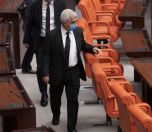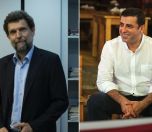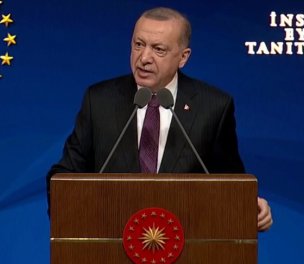Click to read the article in Turkish
In an article penned for bianet Turkish, Peoples' Democratic Party (HDP) Honorary Chair and Parliamentary Assembly of the Council of Europe (PACE) Honorary Member Ertuğrul Kürkçü has criticized the attitude of the European Union (EU) to the rights violations in Turkey.
Touching upon a series of statements released by the EU, such as the conclusion adopted by the European Council in late March and a recent piece penned by Josep Borrell, Kürkçü's article came after HDP's Ömer Faruk Gergerlioğlu, who had been stripped of his MP status, had an angio in police detention and was sent to prison shortly afterwards.
Referring to Gergerlioğlu's imprisonment, Kürkçü writes, "Due to the cardiac and blood pressure problems caused by the blows he received and the insults he was subjected to, Gergerlioğlu could not be taken to prison immediately. He had to be taken to the intensive care unit. He was abducted from hospital without informing his family and put in jail.
"What will happen there? No one can guarantee it. What can these monsters do to our deputy who defends the dignity of the victims by bringing up the issue of strip search? Even thinking about it is beyond endurance."
It was on March 17, 2021, when HDP Kocaeli MP Gergerlioğlu was stripped of his MP status. On the same day, the Chief Public Prosecutor's Office of the Court of Cassation filed a closure case against the HDP, demanding a political ban for 687 HDP politicians for five years.
These two developments targeting the second biggest opposition party at the Parliament happened in the wake of the "Human Rights Action Plan", which was unveiled by President and ruling Justice and Development Party (AKP) Chair Recep Tayyip Erdoğan on March 2, 2021.
In his article "'Europe of Rights' at death's door", Ertuğrul Kürkçü says, "Erdoğan indeed has a 'plan', but this plan is not oriented towards the 'domestic market', as is shown by the operation to bring down the HDP."
"The 'plan' is mainly designed to function as a leverage to restore the sour relations with the EU and the US. The EU jumps at it," he explains.
'We will not water every flower,' said Erdoğan
According to Kürkçü, apart from his being an MP of the HDP, the reason why Gergerlioğlu was subjected to all this unjust treatment is the fact that "he is a Muslim and those who are in the backyard of the AKP hear his voice, while he hears and reflects the cry of 'the [religious] community members' who are subjected to an atrocity that everyone turns a deaf ear to."
So, the ruling against him was read out at the Parliament and Gergerlioğlu was stripped of his MP status "because the order was from the top."
As Kürkçü notes, "while all these were happening, even the ink of the 'human rights action plan' boastfully put into effect by Erdoğan was not dry."
Then, why was the action plan introduced in the first place?
According to Ertuğrul Kürkçü, "in order to prevent any misunderstandings by the people concerned, AKP's President also offered a user's guide, along with the plan." In unveiling the plan, Erdoğan indeed said, "We will not water every flower we see. While watering a flower drooping of thirst means serving justice, watering a thorn might come to mean atrocity."
Accordingly, Kürkçü comments on the intention behind the "Human Rights Action Plan" unveiled by Erdoğan briefly as follows:
'Human rights are not their priority'
"Erdoğan indeed has a 'plan', but this plan is not oriented towards the 'domestic market', as is shown by the operation to bring down the HDP.
"The regime's plan to bring down the HDP, which is the keystone of any democratic coalition in the 'domestic market', is looking out for pushing the party under the 10-percent national election threshold, thereby paving the way for Erdoğan for one more term in power.
"Then, why is the 'human rights plan' necessary for him? Erdoğan apparently spared no expenses to save his addressees from the trouble of reading between the lines. He said the following in unveiling the plan:
"'In this respect, we will be focusing more on our efforts regarding the European Union, especially with respect to the Visa Liberalization Dialogue. [...] Similarly, we are introducing legal arrangements which are in line with the European Union 'Framework for Screening of Foreign Direct investment'. [...] Another important objective under this heading is to protect privacy in the context of processing personal data. For this purpose, we are harmonizing the Law on the Protection of Personal Data with European Union standards.'
"As clearly seen, Erdoğan's 'plan' is mainly designed to function as a leverage to restore the sour relations with the EU and the US."
In this context, Kürkçü underlines that the priority of neither the US nor the EU is "human rights". Their priorities are rather the military-strategic and economic issues, such as the drilling activities in the Eastern Mediterranean, Cyprus issue, the purchase of S-400s from Russia and migration from Syria and Middle East, according to Kürkçü, who further comments, "'Human rights' are not their problem, it is the problem of the European public."
What the Council of Europe 'took note of'
At this point, Kürkçü draws attention to the fact that "this grand 'presidential plan' is a part of the 'Supporting the Implementation and Reporting on the Action Plan on Human Rights in Turkey Project' of the Department of Human Rights of the Ministry of Justice, which is supported by a 1.2 million Euro fund, 85 percent of which is financed by the European Union and 15 percent of which is financed by the Council of Europe."
Amnesty International's "Nils Muižnieks can throw away Erdoğan's 'Action Plan' as a 'mockery' all he wants, the Council of Europe gives its 15-percent share in funding the plan its due," writes Kürkçü, explaining:
"Meeting on March 9-11, the Ministers' Deputies of the Council of Europe, after complaining about Turkey's failure to release Osman Kavala despite the Europan Court of Human Rights (ECtHR) judgement, 'took note of the recent adoption of the new Human Rights Action Plan and encouraged the Turkish authorities to proceed with the above-mentioned reforms in the context of its implementation, and expressed the readiness of the Council of Europe to provide assistance to this end."
Referring to the European Council meeting on March 25-26 in this context, Kürkçü underlines that "this meeting also had similar results in the sense that there are no sanctions, but 'encouragement'."
"On March 30, in his article published in the blog of the institution, Borrell did not forget about mentioning money so that the issue could be understood better," says Ertuğrul Kürkçü, sharing the below remarks by Josep Borrell, the High Representative of the EU for Foreign Affairs and Security Policy and Vice President of the European Commission:
"[...] Indeed, the EU has a strategic interest in the development of a cooperative and mutually beneficial relationship with Turkey. [...] Looking at the latest pre-pandemic figures, we see €69.8 billion of Turkey's exports directed towards the EU, and €58.5 billion of its foreign direct investment (FDI) coming from the EU. [...] And with its security and defence anchored within NATO, it seems difficult to believe that Turkey could realistically envisage better options than pursuing a European path."
Everything is based on 'win-win'
"As it is seen, everything is based on 'win-win'," writes Ertuğrul Kürkçü, sharing the following comment in this context:
"Those who fund the 'plan' produced by Erdoğan by 'copy-pasting' it from the Constitution for 1.2 million Euro have a paper stamped by the Republic of Turkey so that they can say 'Nothing... We are talking about human rights' if they are asked, 'What are you up to with Ankara?'.
"As for the ones in Ankara, they ensure that Germany's Foreign Minister Haas hisses through his teeth, 'They should clearly distance themselves from the PKK,' while Dr. Gergerlioğlu is dragged to prison.
"But what about 'human rights'? It will remain 'proportionate' to 'balanced', 'mutual', 'sustainable' relations and it will, of course, always remain as the issue to be tackled in the next plan."
'Peoples' power is necessary'
Concluding his remarks, Kürkçü stresses that "in history, rights did not derive their strength from bargains, but from the historical actions that ended the bargains; that was how they acquired the power of law.
"The 1793 Declaration of Rights of Man and the Citizen noted that 'resistance is the most sacred right and the most indispensable duty when the government violates the rights of the people.' Human rights were born out of a revolution, it is now dying in a wretched order of bargaining.
"Neither the power of an interstate institution nor the fortune of an international firm can bring it back to life: There is a need for a single thing - here and abroad - to do this, there is a need for peoples' power and breath." (EK/NÖ/SD)




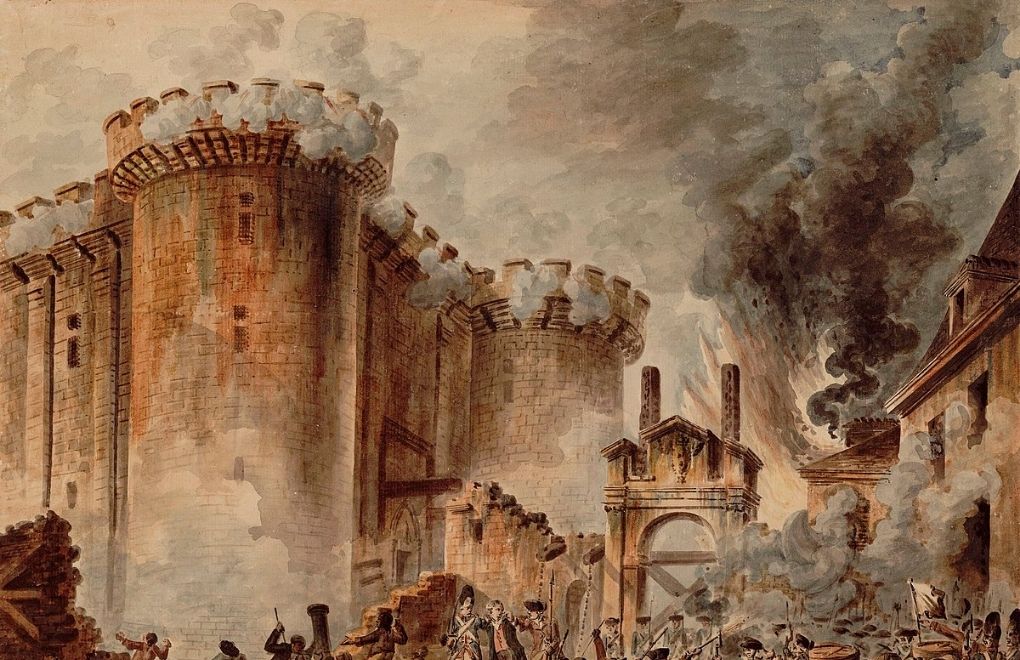


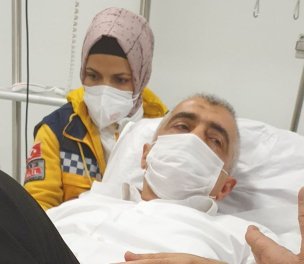

-132.jpg)
